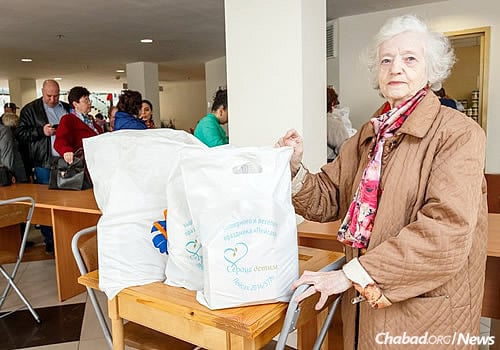Russian Jewish individuals and families who received food packages as part of a large Maot Chitim project there are enjoying Passover with “fuller plates than ever,” according to the charity’s organizers.
The Matan BeSeiser Fund of Moscow’s special Passover drive, which launched right after Purim, operates under the guidance of Chabad-Lubavitch Rabbi Berel Lazar, the chief rabbi of Russia. The charity works to ensure that the indigent receive their holiday needs in a dignified manner, stress organizers. The fund runs throughout the year, helping the Jewish poor and those with large families put food on the table.
All donations for the Passover packages came from the public in response to an extensive ad campaign.
The distribution of the food baskets, which included boxes of matzah, ketchup, cooking oil, sugar, jam, chicken, pre-packaged cake and more—all kosher for Passover—took place in the Shaarei Tzedek Social Services Center in Moscow. The center provides nourishing meals year-round for the elderly and the needy, as well as other forms of assistance.
Organizers say the project was inspired by the teachings of the Lubavitcher Rebbe—Rabbi Menachem M. Schneerson, of righteous memory: “Since your people’s needs are many, one must begin the shturem (‘tumult’) in advance: immediately after Purim, we begin engaging in maot chitim, progressing and adding more of the holiday needs each day as we near the days of Pesach,” wrote the Rebbe.

In ancient times, these funds would help families procure flour with which to bake their own matzah. That’s why they are generally known by the two Aramaic names of Maot Chitim (“wheat money”) or Kimcha DePischa (“Passover flour”).
Rabbi Yossi bar Avun, who flourished in the Land of Israel in the fourth century, mentions this custom in a statement recorded in the Jerusalem Talmud. It is further strengthened and codified in the writings of the Ashkenazi halachists of the Middle Ages.
By the 18th century, the practice remained common. Thus, Rabbi Schneur Zalman of Liadi writes: “It is a widespread custom amongst all of Israel that every single community places a tax upon its citizens for the purpose of [procuring] wheat for Passover to distribute to the members of their community.”















Start a Discussion